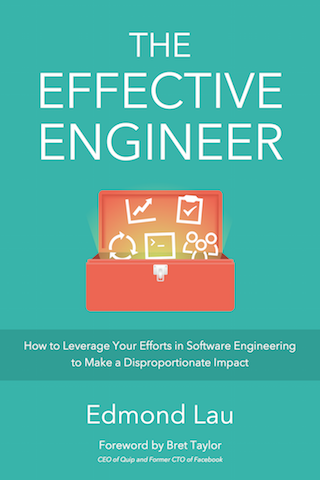Valuable Lessons Learned and Missed from My Time Working at Google

This post was published to my weekly Q&A mailing list and to Quora. Ask your hard questions. Get my honest answers.
Question: Does working at Google really make you deliver your best as a software engineer?
I joined Google’s Search Quality team right out of college. During my two years there — from 2006 to 2008 — I learned many things about how to become the best software engineer I could be.
I learned programming best practices from industry veterans who had distilled decades (probably even centuries) of collective experience into treasured documents of do’s and don’ts and the rationale behind them.
I learned how to design good APIs from Joshua Bloch (the lead architect behind the Java collections API) and wonderful insights from Guido van Rossum (the inventor of Python). There were so many educational tech talks available all the time.
I learned how critical it was to invest in simple building blocks. So much of Google was built on top of shared abstractions like Protocol Buffers and MapReduce, and so much tedious plumbing and hard problems became easy by assuming that these primitives were available.
I learned how having lots of data can trump smart algorithms. Peter Norvig calls this the “unreasonable effectiveness of data.”
I learned how simple, seemingly trivial choices like standardized conventions around how to indent your code matter at scale, when over ten thousand engineers are contributing to a 2+ billion-line code base 1 and anything that reduces confusion and complexity provide huge payoffs.
I learned how useful code reviews were in scaling code quality and how important it was to get iterative feedback on the code that I was writing.
I learned how powerful it can spread engineering cultural values. Every week, a group of Googlers would plaster bathroom stalls with one-page “Testing on the Toilet” flyers that shared the week’s testing tip. What a quirky and fun way to spread knowledge.
I learned how important it was to invest in onboarding materials to ramp up new members of a team. I sponged up all the codelabs, best practices guides, and design docs that I could find, and I was thankful that these resources were so readily available for someone who wanted to learn all he could.
All of these contributed to my effectiveness today as an engineer.
But there were also many things I didn’t learn at Google — things I learned elsewhere and that I consider core to what it means to work effectively as an engineer.
I didn’t learn how to truly be rigorous about prioritizing my work. Google was a fun playground, and my projects never had any real deadlines. Since then, I’ve worked at startups where the choices engineers made directly affected the survival of the company. Those experiences have pushed me to think hard about where I can create the most impact with my time.
I didn’t learn the level of empowerment and ownership that’s possible at a smaller company — where the decisions you make and conversations you have as an engineer can shape the growth and direction of the business.
I didn’t learn what it meant to have a really fast development loop. Resource-intensive problems at Google are generally tackled with C++ 2 — including its web server — which meant that changes to a web application could easily take minutes to compile. Nowadays, any development loop longer than a few seconds feels slow.
I didn’t learn how to trade off building the “right” thing against moving more quickly. Most things at Google are engineered for scale. That means it’s harder to do simpler things that don’t scale, in service of getting a product or feature in front of users sooner — so you can learn if you’re even building the right thing. This was a pattern I had to unlearn from my time at Google.
I didn’t learn how to push the limit of how fast we could iterate and deploy production code. At Google, my team’s code deployed once per week. When I worked at Quora, every commit went straight to production, and we were deploying code 40-50 times per day. It opened my eyes to an entirely different way of working that I hadn’t realized was possible.
I didn’t learn how to trade off code quality with iteration speed. At Google, every piece of code was reviewed because the audience was large, but that also meant code reviews often became a bottleneck. At every startup I’ve worked at since then, engineers selectively reviewed code based on risk and impact, and it’s allowed us to iterate more quickly.
I didn’t learn how to reason about user growth and engagement as a system to be optimized — a perspective that I’ve picked up from Quora and Quip and that provides a valuable lens on your impact.
I didn’t learn how to ask for and give direct feedback to accelerate my own growth and the growth of my team. Google’s feedback system was tied to performance reviews, and getting textual feedback from peers twice a year was just too slow. At Quip, we’ve been experimenting with lightweight, weekly feedback sessions, and it’s been amazingly valuable in connecting and growing the team.
All of these lessons that I didn’t learn at Google I learned later. Some I learned during my time at startups — Ooyala, Quora, and Quip.
The rest I learned during a two-year quest while I was interviewing engineering leaders around Silicon Valley for my book. I’d ask people, “What separates the most effective engineers you’ve worked with from everyone else?” “What’s the most valuable lesson you learned in the past year?” Some themes in their answers would line up with my own experience at Google. Others — though they would show up again and again — surprisingly did not.
If you want to dive deeper into lessons I shared above — as well as what I learned from some of the best engineers at Google, Facebook, Twitter, LinkedIn, Airbnb, Reddit, and other top tech companies — I’ve put together a free collection of the best resources and proven techniques I gathered for becoming the best engineer you can be. They’re based on the interviews I conducted for the book.
Cade Metz, “Google Is 2 Billion Lines of Code—And It’s All in One Place”, Wired, September 16, 2015. ↩
“Why did Google move from Python to C++ for use in its crawler?”, Quora. ↩

“A comprehensive tour of our industry's collective wisdom written with clarity.”
— Jack Heart, Engineering Manager at Asana
“Edmond managed to distill his decade of engineering experience into crystal-clear best practices.”
— Daniel Peng, Senior Staff Engineer at Google

“A comprehensive tour of our industry's collective wisdom written with clarity.”
— Jack Heart, Engineering Manager at Asana
“Edmond managed to distill his decade of engineering experience into crystal-clear best practices.”
— Daniel Peng, Senior Staff Engineer at Google


















Leave a Comment